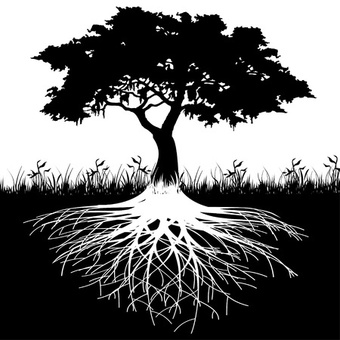
A plant can only grow upward to the extent that its roots grow downward and are established. To a large extent, as Jesus showed in his parable of the sower and the seed, that will depend on the quality of soil the seeds are placed in (Matthew 13:3-8). If the soil is too rocky (vs. 5-6) or already covered with competing weeds (vs. 7), the seed won’t be able to take root or survive. But even in good soil (vs. 8), plant growth (“a hundred, sixty or thirty times what was sown” vs.8b) depends on how far the roots can extend. That isn’t referring to the “hard ground” that seeds cannot take root in at all, but to situations where plants get started, and then run into layers of rock or hard clay. If the roots cannot spread far and wide in every direction, the plant will inevitably be stunted in its growth.
Remembering these basic facts of plant growth help us to better understand the words of the apostle Paul: “… I pray that you, being rooted and established in love, may have power, together with all the Lord’s holy people, to grasp how wide and long and high and deep is the love of Christ” (Ephesians 3:17-18).
Paul tells us two things here – first of all, what the good “ground” is in which we must be planted. Paul says we have to be rooted in love, but it is clear from what he goes on to say that it is not our own love. The love is instead “the love of Christ” (vs. 18). Understanding this is a fundamental part of understanding Christian growth. If we try to grow in the ground of our own human love we will find it is shallow soil indeed. Instead, Paul shows it is the love that God gives that provides deep enough “ground” for real spiritual growth. How deep is that? Paul tells us clearly in saying that we need to grasp “how wide and long and high and deep” God’s love is. In other words, Paul makes it clear that the extent of that ground in which we are to grow – the space in which our “roots” can expand – is virtually infinite.
It’s a principle that Paul stressed more than once. We see it again in his letter to the Colossians: “So then, just as you received Christ Jesus as Lord, continue to live your lives in him, rooted and built up in him, strengthened in the faith as you were taught, and overflowing with thankfulness” (Colossians 2:6-7). Here, we see not only the same analogy of Christian growth like a rooted and growing tree, but also Paul’s stress on the fact that it is as we live our lives in Christ that the rooting and growth occurs.
It’s interesting to compare these words of Paul with the earlier words of the prophet Jeremiah, quoted above – which were doubtless based on the words of David in Psalm 1:3. All three biblical writers use the same analogy of the rooted tree, but all use it differently. David speaks of being rooted in the law of God (Psalm 1:3), Jeremiah speaks of being rooted in trust or faith in God (Jeremiah 17:7), and Paul speaks of being rooted in the love of Christ. All are true, yet perhaps we also see a clear growth of understanding based on progressive revelation. We might say that all three “grounds” provide deep soil for spiritual rooting and growth, but the best ground for the deepest growth is, of course, in God’s love.
 RSS Feed
RSS Feed
